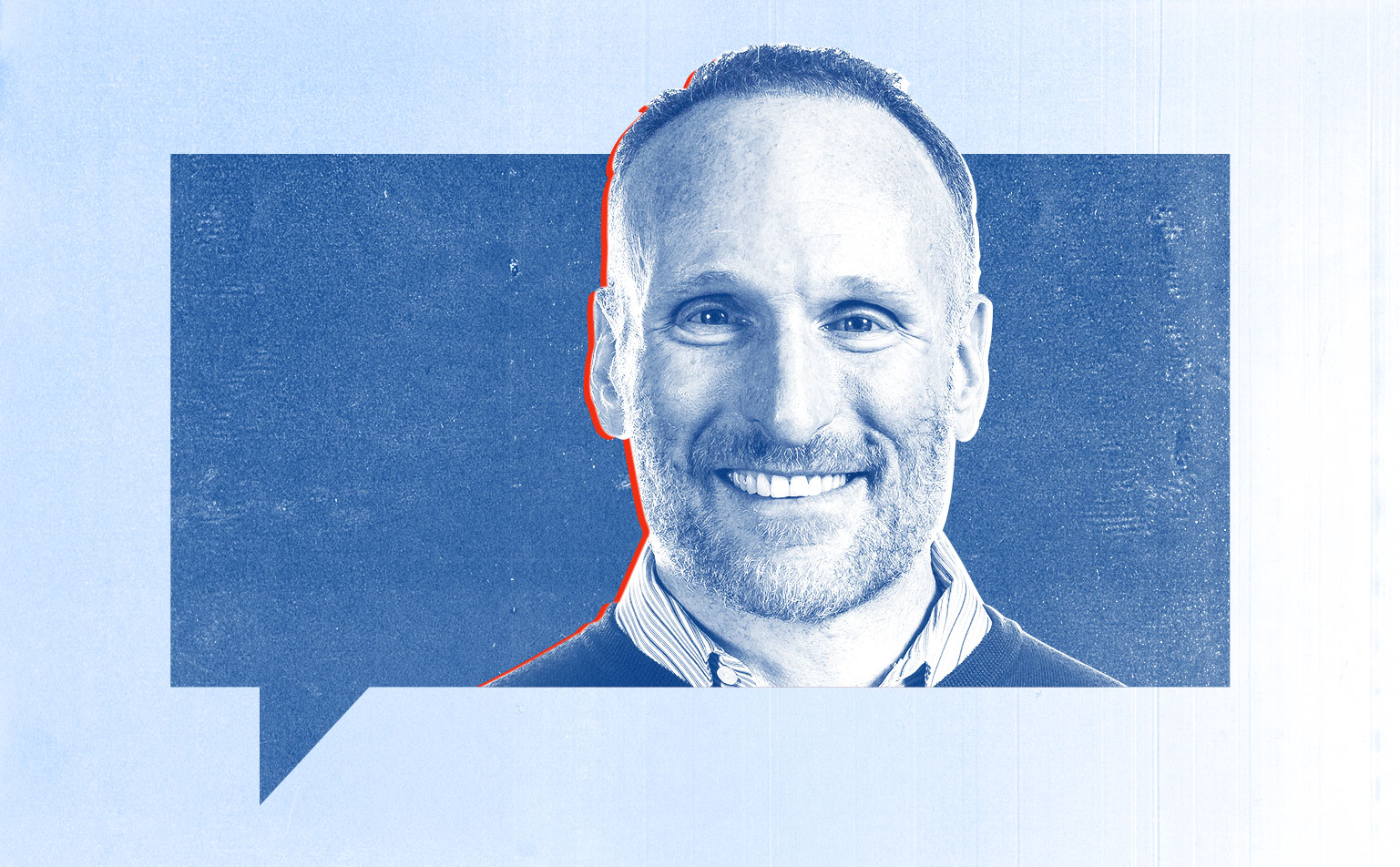Mark Shapiro has worn many hats in his career, but as you’ll read in this interview, he’s always tried to be the same person underneath it all. Mark Shapiro’s focus on growth and self-improvement has led him to his newest role as president and CEO of the Toronto Blue Jays.
We had the opportunity to sit down with Mark Shapiro and learn about his journey from high school to major-league success.
High School

Let’s go back to your final year of high school at Gilman’s School. What mindset were you in as you got closer to Princeton?
That makes me feel old! It’s hard for me to accurately reflect on what my mindset was. I was clearly someone who took a lot of pride in being a student-athlete. I was someone who felt that my group of friends were really important to me. Also, I had the values and the underpinnings that my parents had instilled in me: compassion and tolerance and being willing to embrace diverse environments and cultures.
While baseball was my first love and I played baseball, football was a driving passion. At that point, I was being recruited pretty heavily to play at university. It occupied a lot of my thoughts and a lot of my friendships were centered around athletics and competing.
In summary: highly competitive, strong friend group, and civically-minded.
Post-Secondary

Why did you choose to study History at Princeton?
Initially, I was thinking poli-sci. I took a few classes and it was a little more theoretical than I was interested in at 18-years-old. I gravitated towards historical context, mostly regarding race. Race is so pervasive in much of the history and much of what I was interested in. Many of the social problems that exist within the US are rooted in the racial history of the country. I think that’s probably what drew me to history.
You mentioned that your athletic friends were helpful in that transition from high school to post-secondary. Did anyone else help you with that transition?
I think my parents instilled in me a sense of belief in myself and a great level of self-confidence. Self-confidence is so fragile when you’re young. At that age, a lot of your identity is a byproduct of the strong influences and institutions in your life.
The first important institution was my family, and maybe more than anyone, my father. The second was Gilman, my high school, which had a very strong values-based culture. This was both because of the teachers and because of the general culture that existed there. By transitioning to university, Princeton’s strong history in culture also impacted me. So, I was at an age where I was not yet fully aware of who I was individually apart from those things. Still, those things all had a very positive influence on who I became.
To your point, our audience has told us time and again that they struggle with self-confidence and self-esteem. Do you have any insights for them?
I lived through an awkward adolescence and early high school years—a combination of physically and socially awkward. Everybody has their own ladder out of that insecurity, and for me, sports was that ladder. The head football coach was a massive influence and to this day I’m appreciative of all he did.
Basically, the foundation of who I am is rooted in resilience, perseverance, and determination—that is my core. I am not the smartest and I am not the most talented, but I may be the toughest. You can knock me down, but I’ll get back up again. Sports were a real-life analogy for me. They showed me that I could out-work others. I could get back up when others might not. So, my strength and confidence came from a real-world example that sports offered.
Now, I wouldn’t want to diminish the idea of real adversity. I was not dealing with intense, real adversity in life, but sports gave me micro-glimpses of adversity. Seeing a microcosm of setbacks and challenges gave me the ability to learn and understand what it takes to battle through those things.
Were you involved in co-curricular or extracurricular experiences beyond that?
In high school and during the summers at university, I was involved in politics, volunteering on political campaigns in intercity Baltimore and helping in some of those areas. But playing a varsity sport and maintaining an Ivy League curriculum occupied the bulk of my time.
However, I was in the Big Brother program and my little brother from the program is still part of my life.
Were there any low points in your undergraduate career as a student at Princeton? Did you ever hit rock bottom?
Again, I’m always cognizant that what was low for me is not really a hardship in the spectrum of human experience. I am incredibly fortunate to have never experienced real adversity and real challenges. When you look at the full spectrum of human experience, I’m grateful for the life I have lived.
Football was such a large part of my post-secondary journey. I experienced huge disappointments, as far as playing time and opportunity goes. I also went from a coach who was a seminal influence in my life to a coach I didn’t really connect with or have a respectful relationship with. This lack of connection has been a really interesting thing for me to reflect on as I’ve gotten into sports and leadership in general.
That’s when I began searching for my identity outside of sports. I never quit. I kept playing because it was still important to me, but it became a much lesser part of my experience.
Dream Job

As your son, Kayden, transitioned into UCC, what advice did you impart to him?
Wow, it seems like it was just yesterday.
I’m so careful to avoid sounding preachy with Kayden or Sierra. Yet, I still want to provide them with the benefit of my experiences and let them pick and choose how they apply it. My general thinking is that young people will watch what you do more than they’ll listen to what you say. So, while I will give advice, I also write Kayden and Sierra a letter once or twice per year that’s a reflection of their growth. Often, I think about this while I write those letters:
“If I’m not going to be around, what would I want them to take away from how I observe them living their lives? I think about what I’m proud of and where there are opportunities for them to do other things, so they can grow and learn and develop.”
I make sure to save those physical and digital copies.
Even beyond that, I focus on authenticity. I want to demonstrate what I’m talking about and to live those things in my day-to-day role. Authentic leadership is the only kind of leadership that is sustainable in any field. You need to be the same person—whether you’re a father, brother, son, friend, or leader.
So, I am not different. Talking to you today, I’m the same guy that was talking to my son at the breakfast table this morning. And if I’m different now, if I walk in the building and say, “It’s time to put on my CEO hat,” then it’s going to be read as inauthentic by people here. If my son sees that I’m a different guy here than I am when I’m at home, it’s not going to resonate with him.
I think learning is probably the single most important thing that you can focus on. The only way to stay relevant is to have a beginner’s mindset. Being humble and open-minded is the only way to continually grow and learn.
What has been the Mark Shapiro north star throughout this milestone-laden journey?
Continual perpetual improvement. I think that my north star is recognizing that there is no destination because you’re never done. So, whether it’s your fitness level, intellect, curiosity, or the standards you hold to yourself as a leader, parent, or friend—you’re never finished. You’re always aspiring to be better.
Finding peace with that is my north star. This thought could be anxiety-inducing for a lot of people, so big that it may be overwhelming. But knowing that the journey or the process of continually learning and aspiring to be better in all those roles in life—that’s it. There is nothing more than that. There is no seal of approval, no destination.
Of course, there are superficial markers. I want to win championships and be the best father I can be. Yes, there are things I’d like to do, but none of those things are truly relevant and, for me, they will not signify success. Those are simply benchmarks along the way.
What do you love best about your role as president and CEO of the Toronto Blue Jays?
Two things. First, no two days are ever the same. The nature and cycle of the sport mean you never know what each day’s going to bring. The cycle of events that happened the day before will pull and draw you to a different area.
Second, there is an opportunity to help facilitate or serve as a resource for other people that are on the same journey. My greatest pride falls on all the people that we’ve collectively had a role in helping that are now leading organizations related to baseball and elsewhere. It’s a meaningful and lasting legacy.
To say that you’re a busy man is an understatement. What are some things you do in terms of podcasts, books, mentorships, or communities that help you invest in your own professional growth?
The most important thing is the people you surround yourself with. You have to be with other people who are also on a path of growth. They feed you information, they engage in conversation that challenges you intellectually and causes you to reflect and grow. The culture I’m in and the people I’m around is a big one.
Then I also have healthy habits, both fitness and knowledge-oriented. A large number of articles cross my desk that could send me down a rabbit hole. I find myself on a journey when I’m reading something from Angela Duckworth and she mentions Adam Grant, Erickson, Cade Massey, among many different people that come up. There are writers and researchers I gravitate towards and receive weekly updates from. I sign up for their blogs, read their blogs weekly, and then those send me off on different paths.
The Future

Mark Shapiro, you’re working in what some would argue is one of the most exciting times in Canadian sports. What are some industry trends that you’re keeping an eye on?
We at Major League Baseball are aware that sports entertainment in general needs to adapt to have less dead time and engage fans at a faster pace. So, while respecting the tradition that makes baseball great, we’re focusing on where the opportunities lie to help the game adapt because I think that’s necessary.
Plus, the way people consume entertainment, media, and sport is so different now than it was when I entered the game. The way we make decisions is different. We’re continuing to fight to stay relevant and to understand those aspects of the business.
Still, you can’t recreate the experience of physically sitting in the Rogers Centre, watching what’s happening. That’s something you can’t get through a phone.
I think that’s true. We have the opportunity to create a community here. And that’s something that’s always really important to remember, but then we also have to integrate with that second screen experience.
It’s not good enough anymore to play live sports and have that be your sole attraction. When this stadium was built, standard definition television was the alternative. There were no sports bars, big screen televisions with surround sound, HD or 4K television. All those things exist now.
The reality is that sports bleed into many entertainment alternatives that have a multitude of places where you can consume them. So, your in-stadium experience had better be one that’s compelling. That’s one of the biggest challenges here because this stadium was not built for that.
You hope that winning isn’t the only attraction you can provide. In fact, you hope you can offer the coolest bar in Toronto, the best food in Toronto, and the overall coolest experience. Right now, we’re falling short in those areas and that’s where we need to figure out a way within the confines of this building to address that.
You’ve given our readers incredible and sage advice. What is the best piece of advice that you’ve ever received?
My dad had a quote on his wall that was a huge part of who my parents were and it embedded itself in the fabric of our lives:
“You make a living by what you get. You make a life by what you give.”
That translates into service, but it also can be translated into the way you live. I try to be compassionate and empathetic and to constantly think about what I can do for others. That’s been pervasive in my leadership style and the way I think about leading people, building organizations and creating culture.
Wow. Mark Shapiro, my mind is blown. It’s clear that you breathe the spirit of leadership. Thank you for all that you’ve done for the franchise and for the city.
Mark Shapiro’s well-rounded history turned into many successes: two-time Executive of the Year Award recipient, president and CEO of one of the largest sports franchises in the world.

Turn your downtime into uptime.
*Opinions expressed are those of the author, and not necessarily those of Student Life Network or their partners.




